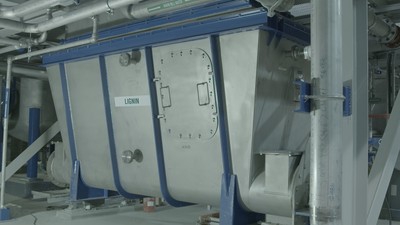
News
Bioeconomy
Pulp
Commercial-scale lignin line starts at Hinton
April 6, 2016 By Cindy Macdonald
 Inside West Fraser's Hinton Pulp lignin recovery plant (CNW Group/Alberta Innovates - Bio Solutions)
Inside West Fraser's Hinton Pulp lignin recovery plant (CNW Group/Alberta Innovates - Bio Solutions) A $30-million, commercial-scale lignin recovery plant at the Hinton pulp mill in Alberta has begun production of lignin. The bioproduct will be developed for use as a natural adhesive in the engineered wood products produced by West Fraser, which also owns the Hinton mill.
The state-of-the art facility will recover lignin from the pulping operation using a novel technology developed by FPInnovations and NORAM Engineering.
The startup of a lignin recovery plant is a major innovation in the forest industry and represents a significant milestone in the growth of the Alberta bioeconomy, said Steve Price, CEO of AI Bio.
“Foresters have long been searching for ways to put lignin to better use,” Price noted. “The ability to recover lignin and transform it into green bioproducts will add more value to an abundant Alberta biomass and contribute to the provincial economy in a sustainable way,” Price said.
Ted Seraphim, president and CEO of West Fraser, said the company recognizes the strategic importance of continuing to develop the company in a manner that fully utilizes the forest resource.
“Lignin is an opportunity to expand our product line and recover the maximum value from our fibre and our manufacturing process,” Seraphim said. “This technology has the potential to be a new product offering for all pulp mills in Canada. In addition, it is a sustainable choice. Every tonne of lignin substituted in phenol-formaldehyde resin prevents a tonne of CO2 emissions from entering the atmosphere,” he said.
West Fraser plans to market lignin as a natural replacement for certain components of phenol-formaldehyde, a synthetic resin that is widely used as an adhesive in engineered wood products, such as plywood, oriented strandboard and laminated veneer lumber. Examples of other potential applications include green chemicals (bio alternatives to petroleum-based chemicals), thermoplastic composites (advanced moldable materials), and packaging.
At the Hinton pulp mill, a portion of the black liquor is diverted from the pulping process. From this, the company can extract high-purity lignin using a proprietary process developed in Canada with FPInnovations and NORAM Engineering, called the LignoForce System™. The Hinton facility is the first commercial-scale implementation of this new technology.
The production plant was made possible through joint funding by industry and government. Alberta Innovates Bio Solutions (AI Bio) awarded West Fraser a $3-million innovation grant. The provincial portion was leveraged with investments from West Fraser and federal government sources, including Natural Resources Canada and Sustainable Development Technology Canada ($6 million). Natural Resources Canada (NRCan) contributed $10 million to the project in 2014 under the Investments in Forest Industry Transformation (IFIT) Program.
AI Bio’s funding agreement with West Fraser includes a provision for the company to contribute $1.5 million into a “lignin research fund.”
Print this page